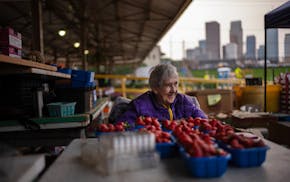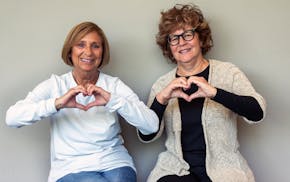Florence Knapp thanks her two book clubs in the acknowledgments of "The Names," which seems especially appropriate because her debut novel has "book club" written all over it.
Specifically, it has my book club written all over it. "The Names" is the sort of novel that's bound to create discussion about the events happening, what they mean and how they relate to one another. It has an ending that's definitive but also leaves plenty of room for interpretation. And it is guaranteed to make readers reflect about their own lives — how they compare to the characters' lives, how they might have gone differently if a few circumstances were changed, how they've been shaped by the choices we and others made.
The key choice in "The Names" is made by an Englishwoman named Cora. The novel begins in 1987, when she's on her way to the registrar to record the name of her newborn son, accompanied by her daughter Maia. Cora's abusive husband has directed her to give the child his name, Gordon, but Cora thinks Julian would be a better choice and Maia likes the cuddly association with a name she invents, Bear.
From that point, "The Names" proceeds in the same lightly speculative vein as "Life After Life" or "The Hours" (or the movie "Sliding Doors"). Each section of the book advances seven years ahead, all the way up to 2022, and each includes three chapters that reveal what happens in the family if the boy-and-eventually-man is named Gordon, Julian or Bear.
"The Names" does not feel at all like science fiction, but more like an investigation of the various ways any of us could have turned out. Certain things remain the same in all three versions: Maia is always a lesbian, for instance, although that manifests in different ways, and the same people drift in and out of the family's life, although some people are more important in one iteration of Gordon/Julian/Bear's life than in others.
As a result, the book asks us to reflect on how our own little choices have altered the courses of our lives. You'd be a different person if you went to your second-choice college, probably, but different how? Would you have ended up with another person if you'd said "yes" to that second date you hesitantly turned down?
These are the kinds of questions my book club would be asking, I'm sure. We'd also be talking about Knapp's gift for insightful, homespun metaphors. One time, she compares a feeling of uneasiness to the sensation of thinking you're at the bottom of a staircase but suddenly realizing there's one more step. Been there! Or there's this description of Cora and neighbor Mehri's approaches to raising kids:
"Mehri has always treated parenting like she's cooking a big warming pan of something: a pinch of that, a pinch of this, she's sure it will turn out fine in the end. Cora's own approach has always felt more like baking a cake: carefully measuring out ingredients and trying not to ruin everything."
Knapp, who previously has written about quilting and crafts, has a simple, seemingly unadorned style but insights like those pop up frequently. Her choices reassure us that she understands people, which helps "The Names" transcend a premise that could come off as gimmicky.
In the end, it's not really a book about names (although it is true that Bear is the cuddliest of the three versions of that character). It's a book that insists that we all contain multitudes and that it's possible for each of us to find the best version of ourselves.
The Names
By: Florence Knapp.
Publisher: Pamela Dorman Books, 326 pages.

Minnesotans find beautiful views, food and fun on trip to New Orleans via train
Ever wonder why the Northwest produces so many serial killers?

Embrace Minnesota's growing seasons at these 76 farmers markets

Old School Jewish Matchmakers offer timeless perspective on dating

